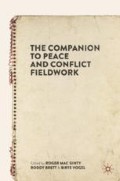Abstract
In the past decade, increasing administrative interest in safety and ethics has drawn new actors into decision-making processes around fieldwork. This chapter argues that despite the resulting new administrative procedures, and unacknowledged by them, researchers are still fundamentally alone in most security-relevant decisions. This is neither surprising nor necessarily a bad thing, but calls for particular attention to the biases, expectations and pressures that researchers are under when making these decisions. From ‘Indiana Jones Researchers’ to ‘Career Risk-Takers’, this chapter identifies harmful discourses around risk and fieldwork in academia and makes suggestions for a healthier way forward.
Access this chapter
Tax calculation will be finalised at checkout
Purchases are for personal use only
Notes
- 1.
Of course, many decisions also include questions of risks to other people, including participants and sub-contracted researchers/‘fixers’. This is a crucial issue for both fieldwork safety and fieldwork ethics, that has been taken up in other sections of this book and has been addressed in a range of recent publications, such as Sukarieh and Tannock (2019) or Peter and Strazzari (2017). Within the scope of this chapter, I focus on risks to independent researcher and particularly Ph.D. students.
- 2.
Alongside a rapidly expanding academic literature, I would recommend the discussions on the platform ‘The New Ethnographer’.
- 3.
While I wish I could take credit for this expression, it has a longer history. Lee (1995) refers to ‘Indiana Jones Imagery’, which is re-formulated as an ‘Indiana Jones class of ethnographers’ by Nilan (2002), before appearing as ‘Indiana Jones Researcher’ in Meyer (2007). I saw one of its most recent and insightful discussions by Laryssa Chomiak on a panel discussion on fieldwork and safety at the annual meeting of the Middle East Studies Association in San Antonio in 2018.
- 4.
Again, the emphasis here is on the possibility of this, not its generality.
- 5.
As mentioned above, this is not limited to Ph.D. students and junior researchers, but is particularly prevalent here.
- 6.
Again, this is not to imply that this does not exist at all, but to emphasise its importance. This book is an example of this type of writing, as are some of the sources quoted above.
- 7.
These notes are to highlight the importance of these topics, not to imply that they don’t currently exist in a variety of departments or contexts.
- 8.
Raddi (2019).
- 9.
It is worth noting that there is a parallel argument to the one made in this chapter that applies to research ethics, however, discussing this in full goes beyond the scope of this contribution.
References
Gallien, Max. 2019. Informal institutions and the regulation of smuggling in North Africa. Perspectives on Politics. https://www.cambridge.org/core/journals/perspectives-on-politics.
Lee, Raymond M. 1995. Dangerous fieldwork. Thousand Oaks: Sage.
Lieberman, Evan S. 2005. Nested analysis as a mixed-method strategy for comparative research. American Political Science Review 99 (3): 435–452. https://doi.org/10.1017/S0003055405051762.
Meyer, Scott D. 2007. From horror story to manageable risk. Formulating safety strategies for peace researchers, June. https://munin.uit.no/handle/10037/1033.
Moller, J., and S. Skaaning. 2015. Explanatory typologies as a nested strategy of inquiry: Combining cross-case and within-case analyses. Sociological Methods Research 46: 1018–1048. Published Online Before Print.
Nilan, Pamela. 2002. ‘Dangerous fieldwork’ re-examined: The question of researcher subject position. Qualitative Research 2 (3): 363–386. https://doi.org/10.1177/146879410200200305.
Peter, Mateja, and Francesco Strazzari. 2017. Securitisation of research: Fieldwork under new restrictions in Darfur and Mali. Third World Quarterly 38 (7): 1531–1550. https://doi.org/10.1080/01436597.2016.1256766.
Raddi, Gianmarco. 2019. Universities and the NHS must join forces to improve student mental health | Gianmarco Raddi. The Guardian, February 15, sec. Education. https://www.theguardian.com/education/2019/feb/15/universities-and-the-nhs-must-join-forces-to-boost-student-mental-health.
Sukarieh, Mayssoun, and Stuart Tannock. 2019. Subcontracting academia: Alienation, exploitation and disillusionment in the UK overseas Syrian refugee research industry. Antipode 51 (2): 664–680. https://doi.org/10.1111/anti.12502.
Author information
Authors and Affiliations
Corresponding author
Editor information
Editors and Affiliations
Rights and permissions
Copyright information
© 2021 The Author(s)
About this chapter
Cite this chapter
Gallien, M. (2021). Solitary Decision-Making and Fieldwork Safety. In: Mac Ginty, R., Brett, R., Vogel, B. (eds) The Companion to Peace and Conflict Fieldwork. Palgrave Macmillan, Cham. https://doi.org/10.1007/978-3-030-46433-2_11
Download citation
DOI: https://doi.org/10.1007/978-3-030-46433-2_11
Published:
Publisher Name: Palgrave Macmillan, Cham
Print ISBN: 978-3-030-46432-5
Online ISBN: 978-3-030-46433-2
eBook Packages: Political Science and International StudiesPolitical Science and International Studies (R0)

